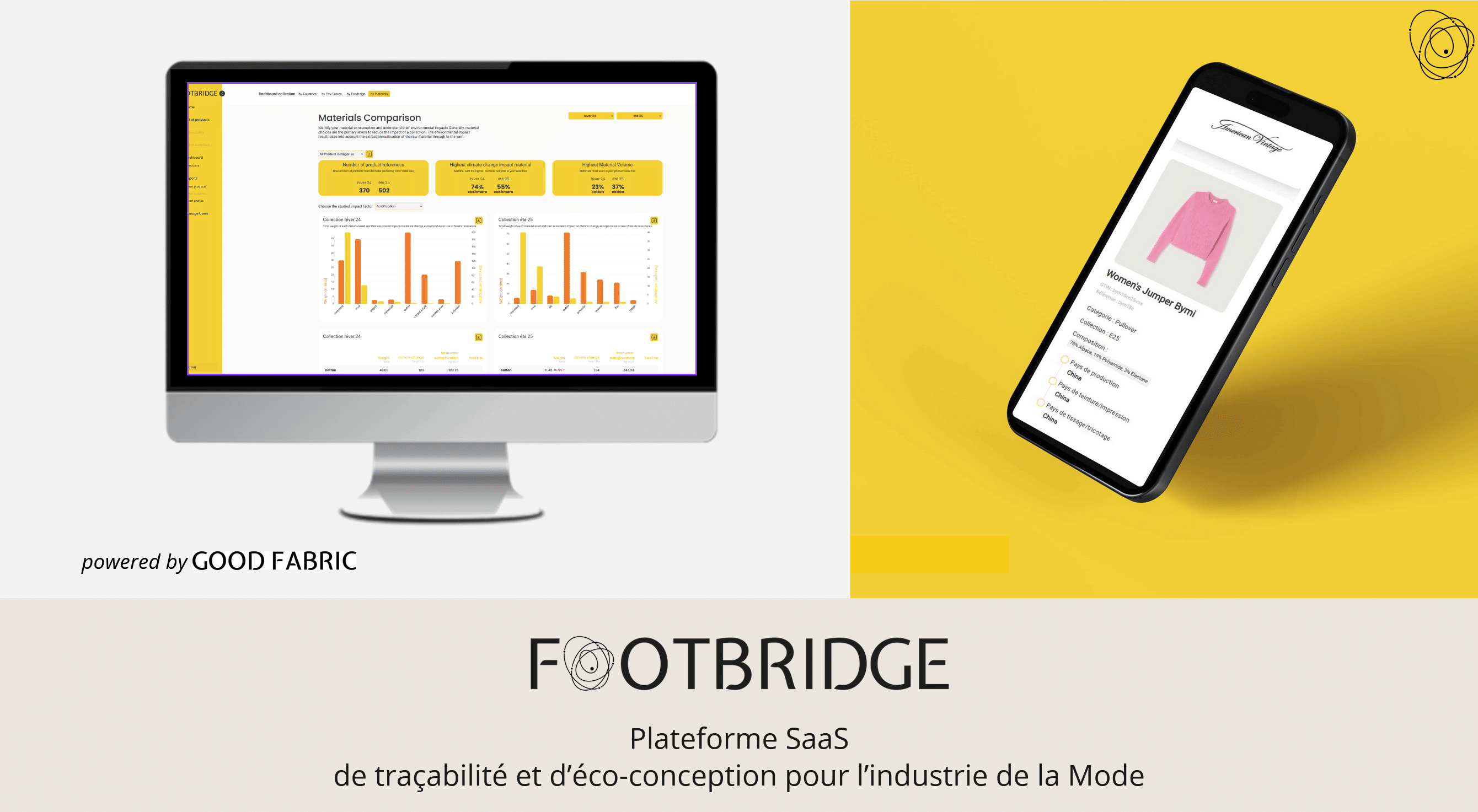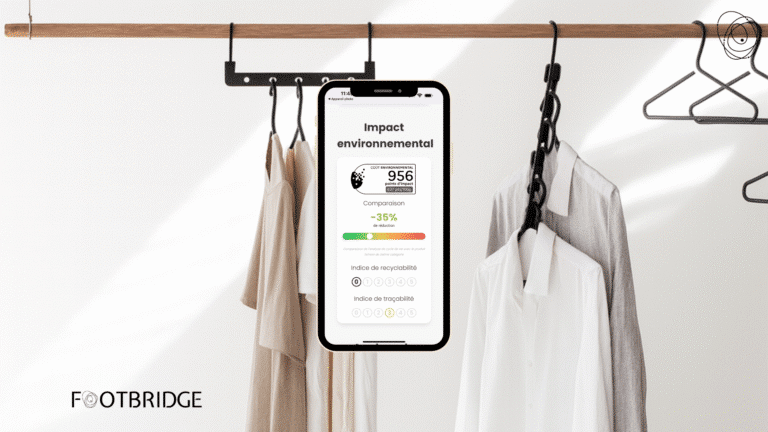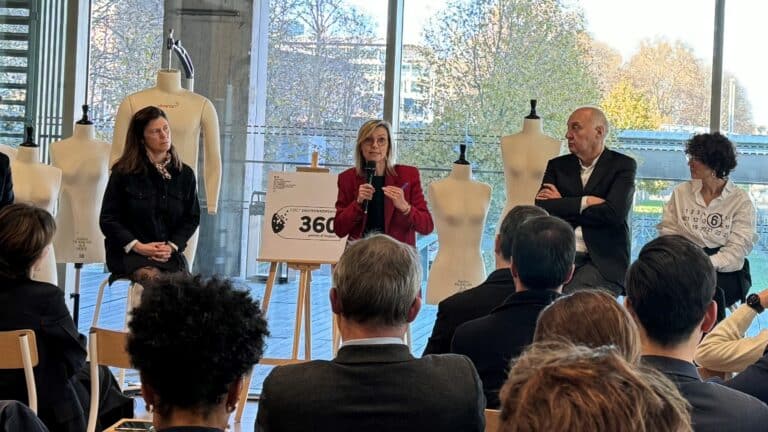FOOTBRIDGE is a SaaS CSR 360 platform offering unified traceability services, environmental impact calculations and compliance with French and European regulations for the textile, footwear and leather goods sectors.
It’s legitimate to ask what operational advantages such a solution offers, compared with the combined use of several specific, complementary platforms or software packages. The important thing is to make the right choice according to your company’s organization, its CSR objectives and the resources allocated to such a project.
Sommaire
What are the advantages of a unified SaaS platform for traceability and impact calculation?
Operational performance requires an analysis of needs and an appropriate response. When it comes to IT/software solutions, opting for simple-to-deploy, fully operational solutions is often a wise choice.
Limiting the number of tools/platforms needed to address CSR, eco-design and supply chain management issues is also a wise choice. Indeed, interconnecting platforms managed by different companies can prove complex. Operational reality is often far removed from theory when it comes to interoperability and compatibility between digital solutions designed and developed in different, even opposing, ways.
Choosing a single platform to handle a number of closely related subjects can be the right choice, as long as it meets functional requirements. The advantages are numerous:
1. Holistic view and centralization of data
- Consolidation of information: A unified platform makes it possible to consolidate supply chain traceability data and environmental impact measurements in a single system.
This is essential. Traceability data is collected and analyzed on the same platform. Complex and costly data transfers between two platforms are no longer an issue.
- Saving time and reducing silos: teams can access all the information they need, without having to juggle between different tools, which encourages cross-functional collaboration.
2. Automation and scalability
- Operational efficiency: A single SaaS platform automates tedious processes natively, with a global view of the services to be delivered, such as data collection or reporting.
- Scalability: A unified platform adapts more easily to company growth and new requirements, whether regulatory or linked to more ambitious CSR objectives.
3. Improved regulatory compliance
- Simplified regulatory monitoring: An integrated solution helps companies to respond effectively to growing legal requirements, such as CSRD (Corporate Sustainability Reporting Directive), DDP (Digital Product Passport), environmental labelling or duty of care.
Business knowledge is a key factor in understanding expectations and developing a fully functional solution.
- Increased auditability: Traceability makes it possible to document sustainable practices and produce compliant reports in the event of control or audit.
4. Optimization of supply chains
- Identification of risks and opportunities: Traceability helps identify weak links (e.g. non-compliant suppliers or those with a high carbon footprint).
- Improved resilience: Increased visibility of supply chains enables better anticipation of disruptions or selection of partners more aligned with CSR objectives.
- Optimized data collection processes: mastering traceability and impact calculation facilitates data collection processes and supplier relations. Supply chain players are called upon to provide all the useful data in an optimized process.
5. Precise calculation of environmental footprint
- Data-driven decisions: By integrating impact calculation modules, companies can assess the real environmental impacts of their products or activities, such as carbon footprint, water consumption or greenhouse gas emissions.
- Tracking progress: This facilitates ongoing performance evaluation and tracking of environmental impact reduction targets.
- Use of Level 2 data: Combining traceability and impact calculation enables accurate supply chain data to be used for more precise LCA calculations based on real data.
6. Creating brand value
- Increased transparency: Consumers and investors value companies able to provide clear evidence of their environmental and social commitments.
- Competitive differentiation: The combination of traceability and impact calculation reinforces the credibility of CSR efforts, increasing stakeholder confidence.
7. Better integration with ESG strategies
- Strategic alignment: An integrated platform links CSR efforts on products to the company’s overall ESG (Environment, Social, Governance) objectives.
- Multi-criteria analysis: Companies can more easily assess their social, environmental and economic performance simultaneously, for balanced decision-making.
In short, a unified CSR SaaS platform that combines traceability and environmental impact calculation becomes a powerful lever for strengthening corporate sustainability, efficiency and resilience, while meeting the growing expectations of stakeholders.
Calculate the eco-score of your clothing
Master the environmental impacts of your designs with our dedicated platform.
Schedule a demoWhat are the advantages of Footbridge?
The FOOTBRIDGE platform was developed based on in-depth expertise in textile manufacturing and eco-design.
FOOTBRIDGE embraces all these advantages. It is also recognized for being :
- User-friendly, easy to deploy and scalable
- Adaptable to the constraints of both SMEs and major brands
- Fully operational
- Dedicated to the apparel, textile and leather trades
- Managed by a team of sustainable fashion experts offering associated services to complement the SaaS platform
- Traceability management
- CSR consulting and support
- CSRD expertise






